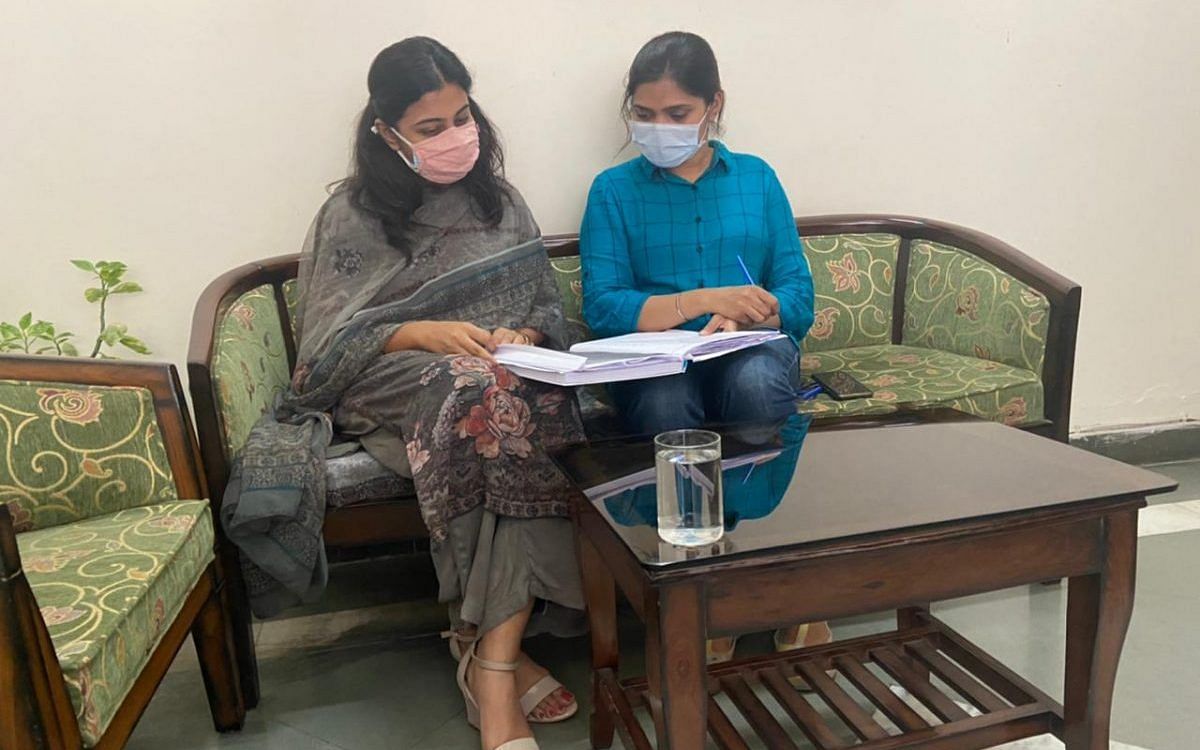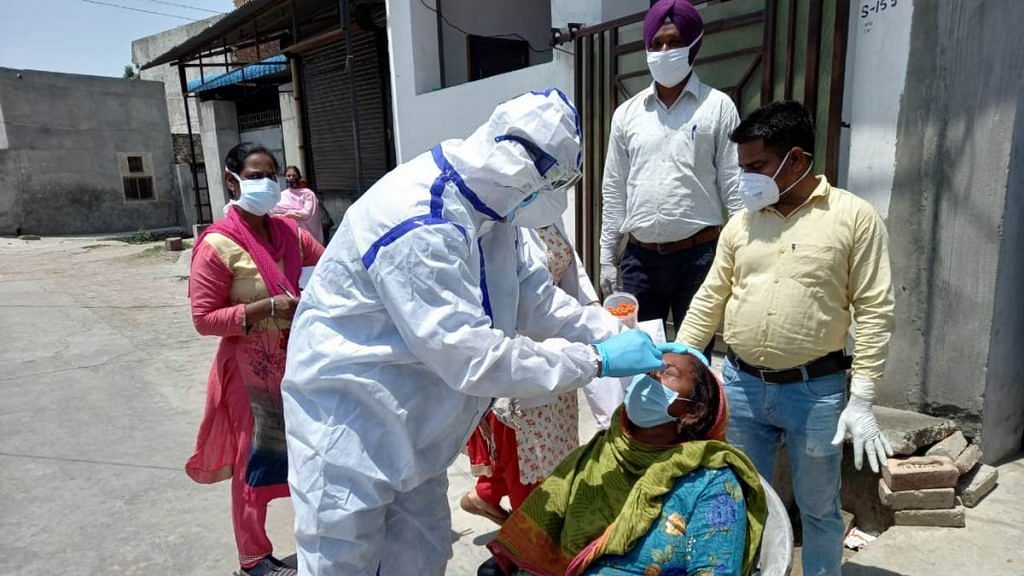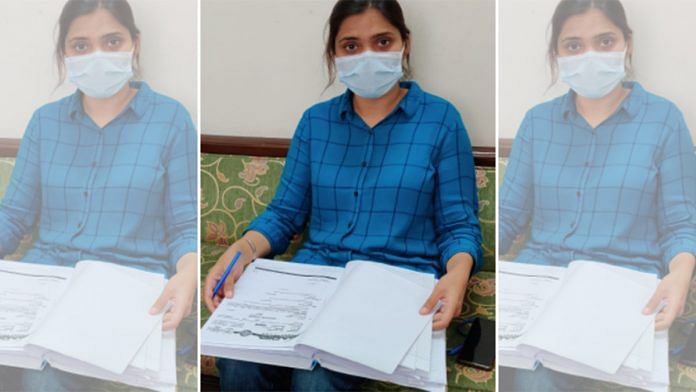Patiala: Dr Ekta, 29, is busy jotting down concerns of her 39-year-old pregnant patient, who has had two miscarriages, suffers from thyroid issues and is now Covid-19 positive. She takes a minute to look at her notes in her diary and then gives out instructions.
“Keep a check on foetal movements, take plenty of fluids, do not miss your antenatal medicine — iron, folic acid,” she tells the patient. “If there is any symptom of pain in the abdomen, leaking or bleeding from vagina, or any decreased perception of foetal movement, call me immediately, we cannot take any risk.”
She then puts down her phone, makes her final notes based on the call and moves on to the next number — this time it is a 41-year-old Covid-positive pregnant woman who is approaching the end of her last trimester.
This is part of a daily exercise for Dr Ekta, the gynaecologist who heads Patiala’s Antenatal Care (ANC) Cell, which was set up on 10 May on the instructions of the Punjab government. The cell tracks all Covid-positive pregnant women across the district — both rural and urban areas.
She has 63 medical officers heading rapid response teams as part of this cell, working across Patiala. The teams, which include doctors and ASHA workers, physically track all Covid positive cases in their respective areas and when they find a Covid positive woman to be pregnant, they segregate that data, put it under a separate column. They then take down in detail, facts on the women’s medical history, previous investigations, in a proforma.
After physically tracking such pregnant women, the teams of doctors and accredited social health activists (ASHA) ready a report to be sent to Dr Ekta, who supervises each case. Once she receives those reports, she personally makes calls to each patient, to give instructions.
“The aim is to ensure no death takes place. Since the needs of pregnant women are different and extra level of caution is required, this Antenatal Care Cell was set up as a specific channel just for pregnant women who contract the virus,” said Dr Ekta, who goes by her first name only. “Apart from consultations, we ensure that any pregnant woman who requires hospitalisation at any stage, is facilitated.”
She adds: “A pregnant woman is at a higher risk of catching respiratory problems. They are more prone to respiratory distress and that is why it becomes tricky.”
Similar ANC cells have been created in other districts of Punjab too.
Also read: How Patiala brought chemists & doctors on board to identify Covid patients and contain spread
No pregnant woman has died since 10 May in Patiala
Apart from running the ante-natal cell, Dr Ekta, who is currently posted as a medical officer at the Community Health Centre in Model Town, Patiala, carries out deliveries and attends to her patients. It was only last year that she had completed her post graduation and was posted at the CHC.
According to Jasleen Bhuller, the extra assistant commissioner who is supervising the work of all the RRTs, Dr Ekta was picked to head the antenatal cell because she is “very sensitive towards the needs of her patients, responsible and responsive”.
“We needed someone sensitive and responsible who is available all the time, even during nights, in case the pregnant women who are positive need any help or assistance and that is why we picked Dr Ekta,” she said.
Bhullar added that the call to build a separate cell for pregnant women was taken after their analysis of the positivity rate among patients showed that a lot of pregnant women were contracting the virus.
“When we were analysing the positivity rate of people, we saw that the cases of pregnant women getting infected were on the rise in April and May and these are high risk patients which require a specialist more than a generalist, so we created this cell and appointed doctor Ekta to monitor these cases,” she says. “This has helped us keep a track of all pregnant women in Patiala and ensure that they get timely help, so that there is no death.”
Since 10 May, according to data with the district administration, there were 75 cases of pregnant women testing Covid positive in Patiala, 62 of whom were isolated at home and four were hospitalised. Currently, there are nine active cases being supervised by the ANC Cell and no deaths of pregnant women have been reported since 10 May.
“We created this cell after guidelines by the state government, but we had been maintaining data of pregnant women who were Covid positive even before that,” says Patiala Deputy Commissioner Kumar Amit.

In Ludhiana, a plan is afoot to have a paediatric cell too, amid anticipation that a possible third wave could hit children more.
“We have been tracking pregnant women who were positive in Ludhiana, and some even delivered while being positive, and are all safe. Moreover, to prepare for the third wave, which may affect children, we are also planning a paediatric cell,” Deputy Commissioner Varinder Sharma tells ThePrint.
How pregnant women are tracked
Explaining how the Patiala administration identifies pregnant women who are infected with the virus, Jasleen says: “We get the entire data on people who test positive on a daily basis, which then goes to our contact tracing cell. The same data is also then shared with the RRTs, which include ASHAs and doctors, who make physical visits to homes of these people.
“The RRTs have been given a pro forma to fill, in case the patient they are visiting is pregnant. This data of pregnant women then comes to the ANC Cell. That is how we separate this data from other cases.”
The pro forma given to ASHAs and medical officers include details of a patient’s last menstruation date, last pregnancy, medical condition, liver functions, last investigation with last date, including ultrasound, and its findings.
Once the filled pro formas reach Dr Ekta, she segregates the cases from “high risk” to “mild”.
“Based on the report sent to us by medical officers of each RRTs, we analyse if the patient is high risk or not. Based on that analysis, we advise the medical officer on further treatment of the patient, if any tests are required, specific diet,” Dr Ekta says. “Moreover, we supervise each case on our own by making frequent calls to the patient. I have also given my phone number to each patient so that they can call me any time in case of any emergency or even advice.”
She adds: “In cases of patients with anaemia, obesity, twin pregnancy, gestational diabetes, hypertension, we make more frequent calls to check on them and ensure that all investigation is done properly.”
To ensure that all the RRTs are actually visiting patients and not just keying in details sitting in offices, the contract tracing cell that calls all positive patients on a daily basis, cross-checks with them on the visit of the doctors.
“We have contact numbers of all patients so we run a check at our end and ask if the doctors on the field have actually visited them or not,” Bhullar says. “Whenever there is a discrepancy, we immediately seek a written explanation from the person concerned.”

‘ASHAs, doctors on the field are the real heroes’
Harinder Deep Kaur, who is due for her first baby after two miscarriages and is Covid-19 positive, says frequent calls by doctors “give her confidence that all will be well”.
“I receive calls two to three times a day from Dr Ekta’s team. She is also available on call. Although I’m being treated at a private hospital, these doctors are always available on call,” Kaur told ThePrint over the phone. “We also have a WhatsApp group where we are asked to put details of our oxygen, BP, pulse rate, which is constantly monitored.”
Suman Gupta, too, has had a similar experience. “The doctors did not just visit but also made frequent calls. I am lucky to have recovered from Covid,” she says. “It was a very bad time. I am now nearing my delivery date.”
Dr Ekta, however, says that the ASHA workers and the medical officers on the ground are the real heroes of the cell as they work day and night on the field.
“It is the ASHA workers, healthcare workers and the doctors on ground who are running this cell as they are the ones who physically track and visit these patients, collect their data and get their records,” she says. “I am supervising each case, but all the credit goes to these teams which are handling these patients in person.”
“Once they report their details to us, we work on how to minimise the risk in each case and provide the required care. I also discuss the course of treatment with these doctors and running this cell is a team work,” she adds.
(Edited by Arun Prashanth)
Also read: This Mohali village has no mobile or internet signal, but knows a Covid vaccine can save lives



